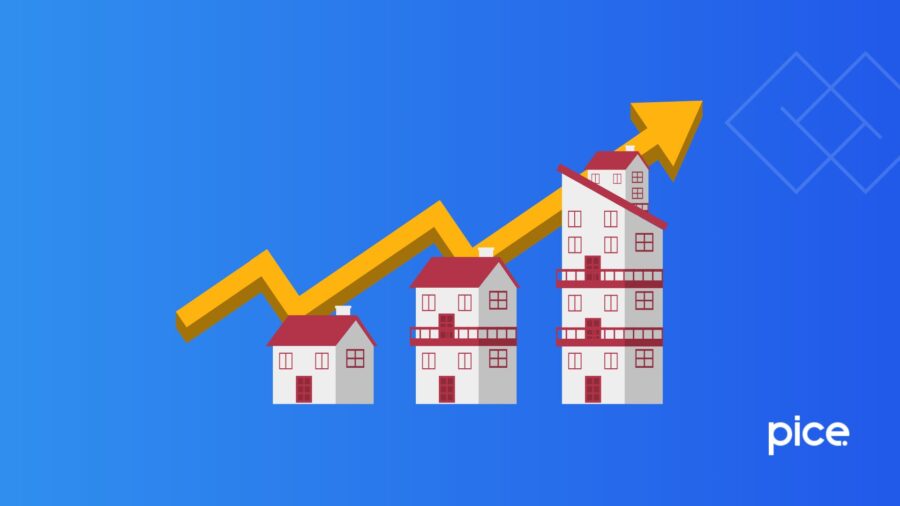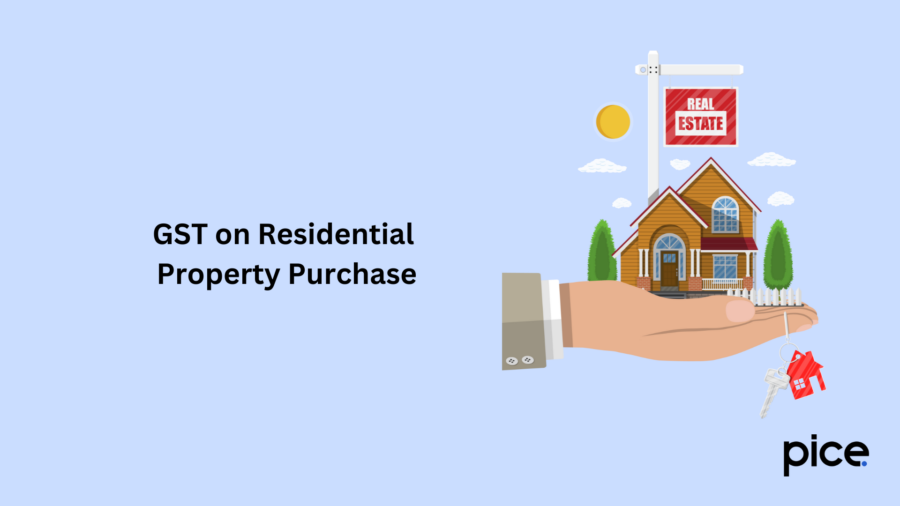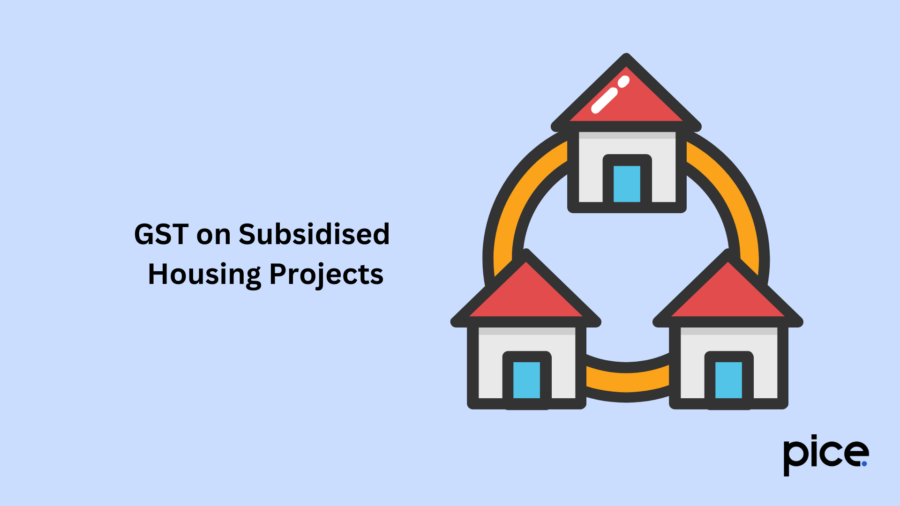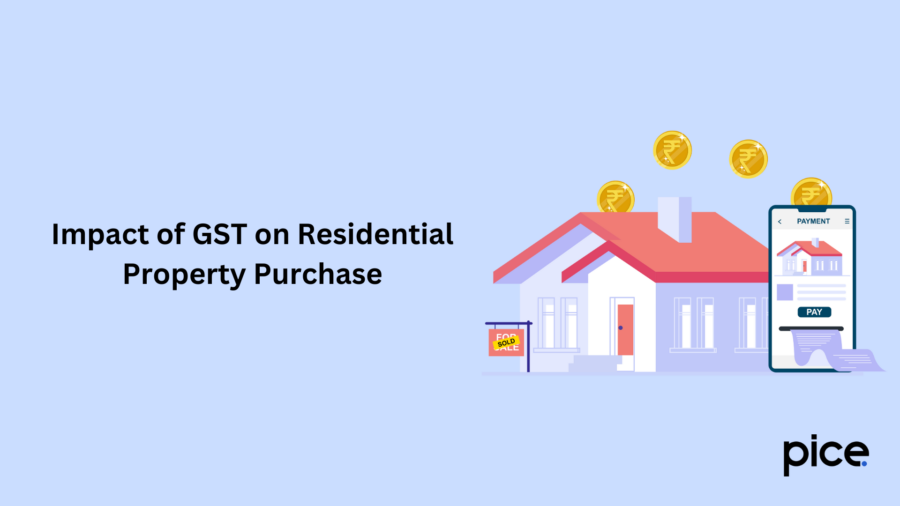GST on Residential Property Purchase
- 19 Dec 24
- 9 mins

GST on Residential Property Purchase
Key Takeaways
- Under-construction affordable housing attracts 1% GST, and non-affordable housing attracts 5% GST, both without ITC.
- Ready-to-move-in properties and land purchases are exempt from GST.
- GST rates for residential properties were reduced post-April 2019, boosting affordability.
- Housing society maintenance fees above ₹7,500/month attract 18% GST.
- GST simplifies real estate taxation, ensuring transparency and reducing cascading taxes.
GST on residential property varies based on the type of property. For instance, an affordable housing project and a non-affordable housing project attract different GST rates. Similarly, a ready-to-move-in property is exempt from GST while an under-construction property attracts GST.
Learn in detail about GST on property purchases (residential and not commercial properties) to make informed decisions.
GST on Residential Property Purchase

Under-construction properties attract GST, whereas ready-to-move-in properties or land purchases do not attract GST. However, the GST rate varies based on the property type, construction phase, and property value.
You can claim input tax credit (ITC) if you have proper documents, such as a tax invoice. Notably, under-construction affordable housing attracts a GST of 1%, while under-construction luxury housing (non-affordable) attracts a GST of 5%.
GST on the purchase of a flat
If you purchase under-construction flats in Indian megacities, you need to pay a GST. However, as a finished project acquires a certificate of completion from the relevant authorities, it does not attract GST.
Here is the applicable GST tax rate on residential property before and after March 2019:
| Residential Property Types | GST Rate Till March 2019 | GST Rate Applicable from April 2019 |
|---|---|---|
| Affordable housing under-construction | 8% with ITC | 1% without ITC |
| Non-affordable housing under-construction | 12% with ITC | 5% without ITC |
| Ready-to-move-in Properties | Not applicable | Not applicable |
Taxes Before the Introduction of the GST
Before the implementation of GST in 2017, developers had to pay multiple central and state taxes. Further, developers were ineligible to claim ITC against the output liability before GST introduction. This increased the tax burden on property purchasers and the cost of project development for a property builder and developer before the introduction of GST.
Here are the taxes that real estate developers were liable to pay before GST implementation:
- Entry Tax
- LBT
- Value Added Tax (VAT)
- Service Tax
- Central Excise
- Octroi and others
The applicability of the above-mentioned taxes resulted in property buyers paying the developer's tax expenses. Moreover, developers could easily evade taxes with a complex taxation structure. To eradicate these complexities, the Indian Government introduced GST, which is a uniform tax, in 2017.
Types of State and Central Taxes That the GST Absorbed
GST replaced the following central and state taxes:
Central Taxes:
Here are the central taxes that GST absorbed:
- Service Tax
- Central Sales Tax
- Excise Duty
- Customs Duty
- Special Additional Duty of Customs
- Central surcharge and cess on supply of goods and services
State Taxes:
Here are the state taxes that GST replaced:
- Purchase Tax
- Entertainment Tax
- Luxury Tax
- State Value Added Tax
- State Excise Duty
- State surcharge and cess on supply of goods and services
- Taxes on lotteries, gambling and betting
- Taxes on Advertisement
What Does GST's Input Tax Credit (ITC) Entail?
The GST system entails a benefit to claim input tax credit. A real estate developer has to pay multiple taxes to acquire goods and services while developing a housing project. However, the developer can claim ITC when he/she pays output tax.
For instance, suppose the total tax liability of a developer on finished products is ₹30,000. If the developer pays an input tax of ₹25,000 to buy materials such as steel, paint, cement and others, the total output tax payable will be ₹5,000 after adjustment.
Conditions Governing GST on Residential Real Estate Market
You can be eligible to qualify for a 1% GST exemption on residential property under the following conditions:
| Property Location and Type | Property Size and Price |
|---|---|
| If in a metro city, the property comes under affordable housing | And the area of the under construction house is 60 square metres with property costs up to ₹45 lakh |
| If in a non-metro city, the property comes under affordable housing | With an area under construction of 90 square metres and a price of up to ₹45 lakh |
Additional Conditions to Receive 1% GST on Flat Purchases
You can be eligible for a 1% GST rate on flats in the following conditions:
- If you purchase at least 80% of the raw materials from a registered dealer.
- When the developer pays 18% GST under RCM (reverse charge mechanism).
Notably, the 1% GST payable on affordable housing under construction excludes ITC. As a result, the GST that you pay cannot be deducted from your income. Further, you cannot reap the benefits of lower yearly income tax on your annual income.
Calculation of GST on the Purchase of a Flat in India
Here are the applicable GST rates on factors associated with purchase of property in India:
GST on Registration of a Flat
Property registration does not attract GST in India. For instance, if you purchase under-construction affordable housing, you will have to pay the applicable GST on the cost of the property. However, you will not have to pay GST on property registration.
GST on Subsidised Housing Projects

Applicants under schemes like Rajiv Awas Yojana, the Pradhan Mantri Awas Yojana, the Jawaharlal Nehru National Urban Renewal Mission and others, will be subject to only 1% GST.
GST for Construction Services
Here are the applicable GST rates for construction-related services:
| Construction Services | Applicable GST Rate |
|---|---|
| An under-construction home bought under PMAY CLSS (credit-linked subsidy scheme) | 8% |
| Under-construction property purchases without subsidy | 12% |
| Works contract for affordable housing | 12% |
GST on Maintenance Fees for Housing Societies
If you are a flat owner paying at least ₹7,500 as maintenance fees, you need to pay a GST of 18%. Similarly, housing societies and resident welfare associations (RWA) need to pay a GST of 18% if they collect ₹7,500 per unit per month for maintenance. If housing societies and RWAs collect an annual revenue of less than ₹20 lakh, they are exempted from GST.
Notably, the full amount will be taxable if each member pays maintenance fees of more than ₹7,500. For instance, if the maintenance fee payable by each member each month is ₹9,000, a GST of 18% applies to ₹9,000. Multi-flat owners in a single housing society will be liable to pay taxes individually.
GST Rate on Developable Land
Purchase of land is exempted from GST even if some basic infrastructure has been constructed. The Central Board of Indirect Taxes and Customs (CBIC) passed a circular in August 2022 enforcing GST exemption on the sale of developable land.
However, earlier certain state authorities followed a different rule. For instance, the Madhya Pradesh Appellate Authority of Advance Ruling (AAR) stated in July 2022 that basic infrastructural construction on land will attract a GST of 18%. Further, the Gujarat Authority of Advance Ruling declared a similar rule in 2021. Recently the Karnataka AAR implemented a rule similar to that exercised by CBIC.
One must note that direct taxes such as stamp duty and property registration fees applied while VAT did not extend to the sales of immovable properties before GST's implementation.
Impact of GST on Residential Property Purchase

The implementation of new GST rates after April 2019 has lowered the applicable GST rate on residential property to 1% and 5%. This increased the demand for under-development properties in the affordable segment. However, stamp duty and registration fees remain unaffected by GST rate changes.
Here are the other impacts of GST on residential property purchases:
- Transparency and Accountability: GST is a uniform taxation system that simplifies the tax structure in India. It has reduced the cascading effect and incidents of tax evasion, making the tax structure transparent.
- Cost Implications: In the long run, GST is expected to reduce the tax burden of the property purchaser. However, it initially raises costs for those purchasing under-construction properties due to the 5% GST rate.
Common Misconceptions About GST on Residential Property Purchase
The following are the common misconceptions and the reality about GST on residential property purchases:
- Misconception: GST on property purchase is calculated similarly to any other GST implementation.
Reality: The GST rates applicable in the real estate sector vary significantly from the GST rates in other sectors. Thus, GST on property is calculated based on the specific rates and conditions applicable to the real estate sector.
- Misconception: GST applies on land purchases.
Reality: GST does not apply to the purchase of land. It applies to the property construction part.
It is advisable to seek professional advice when it comes to navigating GST calculation and implications on property purchases.
Conclusion
The tax structure was revised in April 2019, introducing GST on residential property. Based on the new regulations, affordable housing in Indian property attracts a 1% GST without ITC and non-affordable property attracts 5% GST without ITC.
Previously, an 8% GST was applicable on affordable housing with ITC and a 12% GST was applicable on non-affordable housing with ITC. Thus, the tax rate on residential property decreased significantly after the revision in April 2019.
💡If you want to streamline your payment and make GST payments, consider using the PICE App. Explore the PICE App today and take your business to new heights.
 By
By 















